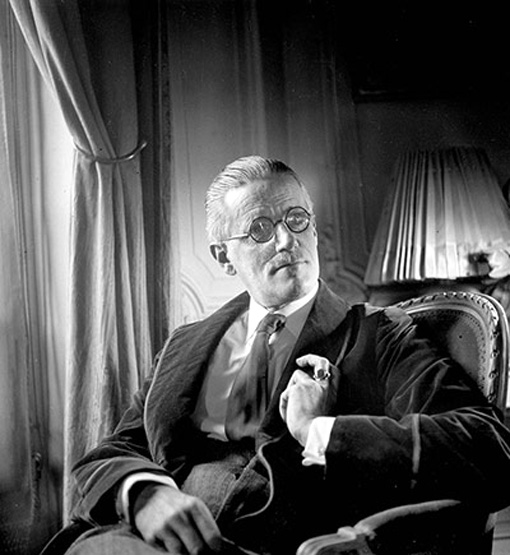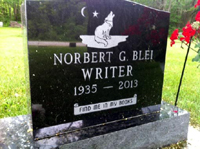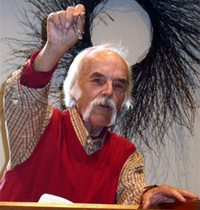 NOTES from the UNDERGROUND No. 215 (& Poetry Dispatch) | April 30, 2012
NOTES from the UNDERGROUND No. 215 (& Poetry Dispatch) | April 30, 2012
The 10 Best First Lines in Fiction
(Our Guide to the greatest lines of novel in the English language from Jane Austen to James Joyce—The Guardian)
James Joyce
Ulysses (1922)
“Stately, plump Buck Mulligan came from the stairhead, bearing a bowl of lather on which a mirror and a razor lay crossed.” This is the classic third-person opening to the 20th-century novel that has shaped modern fiction, pro and anti, for almost a hundred years. As a sentence, it is possibly outdone by the strange and lyrical beginning of Joyce’s final and even more experimental novel, Finnegans Wake: “riverrun, past Eve and Adam’s, from swerve of shore to bend of bay, brings us by a commodius vicus of recirculation back to Howth Castle and Environs.”
Jane Austen
Pride and Prejudice (1813)
“It is a truth universally acknowledged, that a single man in possession of a good fortune, must be in want of a wife.” The one everyone knows (and quotes). Parodied, spoofed, and misremembered, Austen’s celebrated zinger remains the archetypal First Line for an archetypal tale. Only Dickens comes close, with the beginning of A Tale of Two Cities: “It was the best of times, it was the worst of times, it was the age of wisdom, it was the age of foolishness, it was the epoch of belief, it was the epoch of incredulity, it was the season of Light etc…”
Charlotte Brontë
Jane Eyre (1847)
“There was no possibility of taking a walk that day.” The polar opposite to Austen and Dickens, this line plunges the reader into the narrative, but in a low-key tone of disappointed expectations that captures Jane Eyre’s dismal circumstances. Brontë nails Jane’s hopeless prospects in 10 words. At the same time, the reader can hardly resist turning the first page. There’s also the intriguing contrast in tone with her sister Emily, who opens Wuthering Heights with: “I have just returned from a visit to my landlord – the solitary neighbour that I shall be troubled with.”
Mark Twain
The Adventures of Huckleberry Finn (1884)
“You don’t know about me, without you have read a book by the name of The Adventures of Tom Sawyer, but that ain’t no matter. That book was made by a Mr. Mark Twain, and he told the truth, mainly.” The influence of this opening reverberates throughout the 20th century, and nowhere more so than in JD Salinger’s The Catcher in the Rye: “If you really want to hear about it, the first thing you’ll probably want to know is where I was born, and what my lousy childhood was like… and all that David Copperfield kind of crap, but I don’t feel like going into it, if you want to know the truth.”
PG Wodehouse
The Luck of the Bodkins (1935)
“Into the face of the young man who sat on the terrace of the Hotel Magnifique at Cannes there had crept a look of furtive shame, the shifty, hangdog look which announces that an Englishman is about to talk French.” A classic English comic opening, perfectly constructed to deliver the joke in the final phrase, this virtuoso line also illustrates its author’s uncanny ear for the music of English. Contrast the haunting brevity of Daphne du Maurier in Rebecca, partly situated in the south of France, and also published in the 1930s: “Last night I dreamt I went to Manderley again. “
Anthony Burgess
Earthly Powers (1980)
“It was the afternoon of my eighty-first birthday, and I was in bed with my catamite when Ali announced that the archbishop had come to see me.” This is one of the supreme show-off first-person openings. Burgess challenges the reader (and himself) to step on to the roller coaster of a very tall tale (loosely based on the life of Somerset Maugham). It is matched by Rose Macaulay’s famous opening to The Towers of Trebizond: “‘Take my camel, dear,’ said my Aunt Dot, as she climbed down from this animal on her return from High Mass.”
Dodie Smith
I Capture the Castle (1948)
“I write this sitting in the kitchen sink.” A brilliant beginning to a much-loved English classic, which tells us almost all we need to know about the narrator Cassandra Mortmain. Quirky and high-spirited, Dodie Smith’s novel is really an exercise in nostalgia. Smith (subsequently famous for The Hundred and One Dalmatians) was living in 1940s California, and wrote this story, in a sustained fever of nostalgia, to remind her of home. Perhaps only an English writer could extract so much resonance from that offbeat reference to “the kitchen sink.”
Sylvia Plath
The Bell Jar (1963)
“It was a queer, sultry summer, the summer they electrocuted the Rosenbergs, and I didn’t know what I was doing in New York.” Postwar American first lines don’t come much more angsty or zeitgeisty than this. Compare Saul Bellow’s Herzog: “If I am out of my mind, it’s all right with me, thought Moses Herzog.” First published under the pseudonym “Victoria Lucas”, this first novel seems to parallel Sylvia Plath’s own descent into suicide. In fact, The Bell Jar was published only a month after its author’s tragic death in the bleak winter of 1963h resonance from that offbeat reference to “the kitchen sink.
Donna Tartt
The Secret History (1992)
“The snow in the mountains was melting and Bunny had been dead for several weeks before we came to understand the gravity of our situation.” In this spooky opening, Tartt plunges the reader into the middle of a crime whose consequences will reverberate throughout the ensuing pages. Like all the best beginnings, the sentence also tells us something about the narrator, Richard Papen. He’s the outsider in a group of worldly students at Hampden College in rural Vermont. He was expecting a break from his bland suburban Californian life, but he doesn’t quite understand what he’s got himself into.”
Robert Louis Stevenson
Treasure Island (1883)
“Squire Trelawnay, Dr Livesey, and the rest of these gentlemen having asked me to write down the whole particulars about Treasure Island, from the beginning to the end, keeping nothing back but the bearings of the island, and that only because there is still treasure not yet lifted, I take up my pen in the year of grace 17– and go back to the time when my father kept the Admiral Benbow inn and the brown old seaman with the sabre cut first took up his lodging under our roof.” Among the most brilliant and enthralling opening lines in the English language.
[from: The Guardian The Observer, Robert McCrum, Saturday, April 28, 2012]
![]()
Editor’s Note: I’m sure not everyone would agree with these ten choices, still it’s a pleasure to entertain them, recall some of these first lines or be introduced to others for the very first time. Though I agree most with Joyce’s, Ulysses and Twain’s, Adventures of Huckleberry Finn, I would add some favorite first lines of mine:
Herman Melville
Moby Dick (1851)
“Call me Ishmael.”
Ernest Hemingway
The Old Man and the Sea (1952)
“He was an old man who fished alone in the Gulf Stream and he had gone eighty-four days now without taking a fish.”
Vladimir Nabokov
Lolita (1955)
“Light of my life, fire of my loins.”
Ralph Ellison
Invisible Man (1952)
“I am an invisible man.”
Charles Dickens
A Tale of Two Cities (1859)
“It was the best of times, it was the worst of times, it was the age of wisdom, it was the age of foolishness, it was the epoch of belief, it was the epoch of incredulity, it was the season of Light, it was the season of Darkness, it was the spring of hope, it was the winter of despair.”



























































Jeez Norb, how could you overlook this one? “It was a dark and stormy night; the rain fell in torrents — except at occasional intervals, when it was checked by a violent gust of wind which swept up the streets (for it is in London that our scene lies), rattling along the housetops, and fiercely agitating the scanty flame of the lamps that struggled against the darkness.” — Edward George Bulwer-Lytton, Paul Clifford (1830)
So now, I’ll have to reread all the above being tempted by the outstanding openings. Thanks, Norb.
The opening line to The Secret History is intriguing enough to send me straight to my kindle, grazie N
YES! Lolita! My favorite first line…and book..
Marie I would like to give you my email. Please contact me if you wish to contact this old friend. Pam Herriman
Great list! I’m glad you added Moby Dick and Tale of Two Cities! By far, my favorites!
Reblogged this on L'ombelico di Svesda.
Reblogged this on To a dusty shelf we aspire.
I have to add one from the wonderful and tragic British author, Ann Quin; the first line of her first novel, Berg, is:
“A man called Berg, who changed his name to Greb, came to a seaside town intending to kill his father . . .”
Who can resist that? For more on Ann Quin visit http://wp.me/p1mTHK-NQ .
[…] George Bulwer-Lytton, Paul Clifford (1830) (post inspiration) Rate this: Share this:EmailFacebookTwitterStumbleUponDiggRedditPrintLike this:LikeBe the first to […]
“Because I am an officer and a gentleman, they have given me my notebooks, pen, ink and paper”
The opening lines to Jennifer Johnston’s “How Many Miles to Babylon” immediately seem ominous. We know that a dreadful fate awaits the narrator. He goes on to tell us that he is committed to no cause and loves no “living person”, which again intrigues us. He then tells us that he has no future except what you can count in hours.